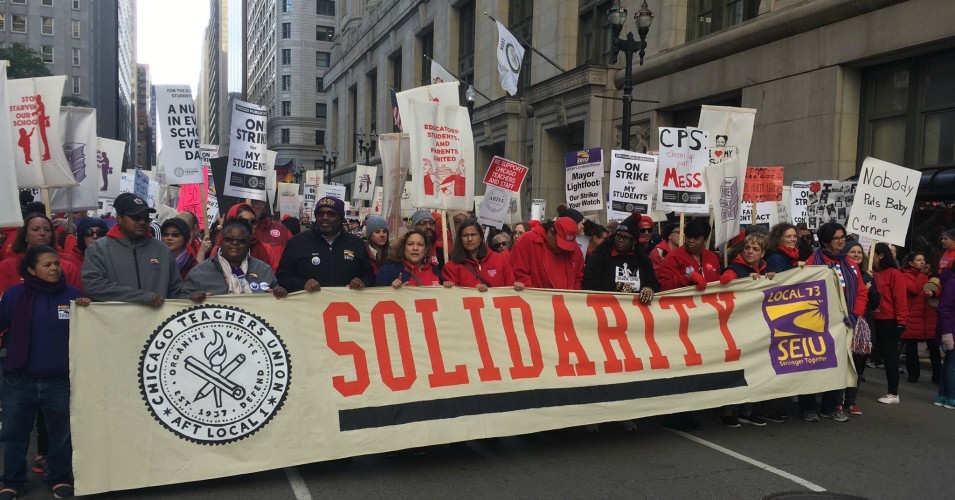
Sarah Chambers is a rank-and-file member of the Chicago Teachers Union (CTU) and a member of their bargaining committee.
Fight Back!: How did this strike compare to 2012? What you were demanding? What was won?
Sarah Chambers: There were a lot of similarities between 2012 and this year’s strike, because we were fighting for a lot of the same things: smaller class sizes, more staffing, wrap-around services, stronger protections.
The biggest difference now is that in 2012, we were fighting austerity. Rahm was trying to steamroll the CTU and gut our contract. This time around, our new mayor, Lori Lightfoot, ran on CTU’s platform. During the strike it became clear she didn’t actually believe in what she campaigned on.
In 2019, we won a lot of these items, even though they were “not strikeable” according to law 4.5 (Section 4.5 of the Illinois Educational Labor Relations Act) passed in 1995. We were able to win enforceable small class sizes, which don’t exist in almost any contract in Illinois. We were able to win 250 more nurses, 209 more social workers, basically a social worker and nurse in every school. We won homeless student coordinators, which was never in our contract before. We won bilingual coordinators, and a lot more protection for special education and bilingual education, including class size.
One of our biggest wins, which helped us a lot with our allies, was Sanctuary Schools – 10 articles including schools refusing to let ICE into the building in protection of undocumented students.
It’s amazing that with this contract and this fight, we had just as many members out in the street as 2012. We had rallies with 40,000 teachers, workers, parents and allies out fighting for justice. This is one of the most historic contracts in CTU history. It blew away Law 4.5, all these things we weren’t allowed to strike over.
RELATED CONTENT: The Massive Teacher Strike in Chicago Is Finally Over
Fight Back!: CTU has more restrictions placed on it by state law than any other public sector union. How did that hamper you?
Chambers: In 1995, the state passed this law that removed mandatory subjects that we could bargain over and strike over. They added more things to it over the years, until it made it so we could only bargain over salary, benefits, preparation time and evaluations. We were not able to bargain over class size or staffing. We’ve been trying to bargain over these items especially since 2012. This law only pertained to Chicago Public Schools, not over the private sector, including the charter schools that are now part of the CTU. This past winter and spring we had a wave of charter school strikes where they were able to bargain and strike over anything.
From that, they won contracts with language about smaller class sizes, increases in staffing. This ended up helping when we were fighting for our contract. So, when CTU members in CPS saw what the charter teachers had won, they said, “We deserve that, too. Why don’t our students deserve smaller class size and more staffing? That put a lot of pressure on Lori and CPS. It showed that teachers were fighting for what’s right for our students, and we’re fighting for justice.
During this strike we’ve been able to win so many of these items that we’ve never won before. And in the last day or two of the strike, [State Senate President] Cullerton, [State House President] Madigan, and [Governor] Pritzker said they all would be supporting the elected school board bill and supporting the removal of 4.5. This has been an historic win for us, and I think a lot of our political work, and the charter school strikes helped us achieve this.
Fight Back!: After the 2012 strike, what was the impact on the rest of the class struggle in Chicago? What do you expect to happen now?
Chambers: After the 2012 strike, Rahm Emanuel’s image was really hurt, because people in Chicago, around the country, and the parents supported the teachers, and saw that we were fighting for what’s right and for the students. Before and during this strike, the polling showed that the teachers and the union had even more support. Before we struck, Lori, even after being in office only a few months, her polling was only at 54%. During the strike, Lori said she wasn’t budging on our major issues of class size and staffing. But by the end of the strike, we were able to win some of those things. This was only due to the intense struggle, the strong picket lines, rallies, and civil disobedience. Lightfoot eventually caved.
RELATED CONTENT: Chicago Teachers Carry the Torch for Decades of Militant Worker Struggles
Lori said she was going to be different than Rahm Emanuel, that she would support the schools and public services. But she continued to give $2.4 billion to Lincoln Yards and the 78, which is basically a rich people’s playground, instead of giving money to our schools. We were only able to take money out of the TIF [Tax Increment Financing] funds after days of striking. I believe after the strike that Lori will be a one-term mayor, because her popularity has plummeted, and she doesn’t have the political connections the Rahm Emanuel had.
Fight Back!: When we interviewed you just before the strike ended, you said “No matter what is in the contract, we know we’ll have to continue to organize and fight in the schools, the communities and the streets.” The vote in the House of Delegates was fairly close – a 60 40 split. Will the union be able to unite? Will that division hinder your post contract struggle?
Chambers: Even though we won this historic contract with a lot of new articles and protection, we know that CPS will try to break our contract. There are many articles in our contract now, such as Special Education laws, that many principals are currently breaking. Our saying is that CPS and Lori will do whatever we let them get away with. We have to ensure that we continue organizing in our schools, with the parents and the community to uphold our contract article and ensure that they’re following them.
What that looks like in our schools is making sure we organize our committees, making sure we’re meeting with parents in the Local School Councils, and putting pressure on CPS to make sure they’re upholding our contract.
Even though the vote in the HOD was fairly close, I believe that the ratification vote will be a higher percentage yes after the members fully read through the tentative agreement and fully understand what it means. I know that the union will be united around organizing to uphold our contract and around other current fights that we have to pick with CPS.
Fight Back!: Will you continue to see SEIU Local 73 unite with CTU?
Chambers: The unity between CTU and SEIU Local 73 was very strong on the picket lines. Our brothers, sisters, and siblings in 73 were some of the strongest on the picket lines, they kept the energy up. I foresee that continuing within our schools, and fighting for justice. I also know that November 22 – 24, there’s a big conference of the re-founding of the National Alliance Against Racist and Political Repression. I know a lot of CTU members and SEIU members are interested in going to that conference and participating in continuing the fight for our Black and Latino students and continuing the fight for Black liberation overall.
| Website
Tags: Chicago CTU Lori Lightfoot Strike teachers




